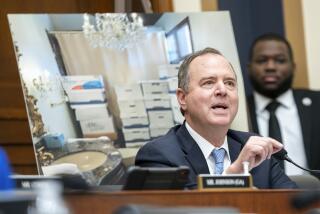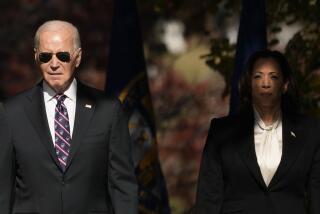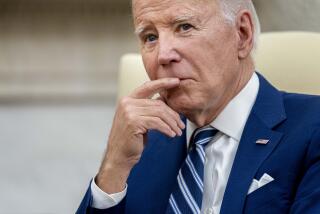Analysis:: For reeling Democrats, now what?
As they struggled through the wreckage of one of their worst election nights in memory, Democrats faced a brutal reckoning over how the party, soon to be out of power on both ends of Pennsylvania Avenue, can regain relevance.
Democrats went into Tuesday’s balloting presuming that they would win the presidency for a third time in a row, gain a majority in the U.S. Senate and, if everything went well, cut into Republicans’ congressional margins, too.
Nothing went well.
Not only did Hillary Clinton suffer defeat at the hands of Donald Trump, but a tide of conservative voters swamped Democrats at other levels.
Sooner rather than later, given unified Republican control of Washington, the damage will include President Obama’s signature achievements, like the healthcare plan Trump and congressional Republicans have vowed to repeal.
“That’s got to be a huge wake-up call for the inside-the-Beltway Democratic establishment. They fundamentally failed,” said Democratic pollster Ben Tulchin, who worked for Vermont Sen. Bernie Sanders’ presidential campaign this year.
Democrats already seemed to be split over how to regroup. Some argued for a more aggressive effort to move the party to the left, hoping to drive up turnout among younger and minority voters. Others stressed a need to reach out to the disaffected working-class white voters who so conspicuously deserted the party this year.
The debate is made even more difficult because, however devastating Tuesday’s defeat was, it was also agonizingly close. Clinton won the popular vote — the second time in 16 years that the Democratic candidate had gotten more votes than the Republican, but lost the electoral college. A switch in three states of only about 50,000 votes out of some 120 million cast nationwide would have been enough to give her the victory.
The narrowness of her defeat made keeping to the same path and striking out in a completely different direction both appear equally plausible options.
Live U.S. election results | Live California election results
In the meantime, however, Democrats were left searching for the basics: a message, messengers, and a structure to defend their goals, since the Democratic National Committee was a handmaiden to Clinton’s defeat.
Essential, all sides say, is a compelling jobs pitch.
“There’s no question that Democrats have to figure out an economic message that resonates with working families who are still devastated by the Great Recession,” said Yvanna Cancela, political director for Culinary Union Local 226, which represents workers at Las Vegas casinos and hotels.
“And I think that message extends beyond the minimum wage and goes deep into income inequality and affordable healthcare,” she said. “It has to be an economic message that really helps people imagine a better life for them and their families.”
Veteran Democratic strategist Mark Mellman, who served as the pollster for John F. Kerry’s unsuccessful presidential campaign in 2004, said the party needed as well to find a way to talk with white voters.
“We have some people upset with the cultural direction of the country,” Mellman said, “and to win, Democrats have to find a way to advance principles and causes that we believe in, while not angering those people in quite the same way.”
Clinton avoided picking sides in her farewell speech Wednesday, talking not about any specific path, but addressing issues on which Democrats should take a stand.
“Let’s do all we can to keep advancing the causes and values we all hold dear: making our economy work for everyone, not just those at the top; protecting our country and protecting our planet and breaking down all the barriers that hold any American back from achieving their dreams,” she said.
Some argued that, as bad as things were, the long-term prospects for Democrats remained rosy. Clinton suffered from depressed Democratic turnout in some areas. That proved fatal when paired with Trump-heightened Republican turnout in usually Democratic states like Michigan, Wisconsin and Pennsylvania.
Even with what happened Tuesday, one argument went, Democrats remain poised to benefit from the decreasing strength of white voters and the increasing numbers of nonwhites, the young, and women.
“The reality is the country is changing demographically and those demographic changes do work in our direction,” Mellman said. “They don’t guarantee anything, obviously, but they do work in that direction.”
But if Tuesday offered any lessons, it was that, unless deftly done, trying to appeal to those ascendant voters risks offending the party’s thinning ranks of white voters, particularly working-class men.
The upside of Democrats’ ethnic appeals was demonstrated in Nevada, a rare bright spot for the party. Driven by the political muscle of retiring U.S. Sen. Harry Reid and Culinary, the state’s most potent labor union, Nevada Democrats favored Clinton, seized a U.S. Senate seat and two congressional seats, and flipped the state Legislature.
Cancela said a Democratic message could be crafted that would unite Latino workers in Las Vegas and factory workers in the industrial Midwest who abandoned the party Tuesday.
“I think you can look at history — look at things like the New Deal, specific policy measures that impact workers and their families,” she said. “I think that connects people across the country.”

A portion of Hillary Clinton’s concession speech.
A generation ago, facing a similar impasse after losing 5 of 6 presidential contests, Democrats moved to the center. That benefited Bill Clinton, helping him win the presidency twice. That shift helped form Hillary Clinton’s political DNA. But now there are fewer voters in the middle as Americans have gravitated to the poles.
That — and the strong primary challenge by Sanders — suggests the party this time will have a strong impulse to hew to the left, though how dramatic a move remains up for debate.
Tulchin argued Tuesday that the Vermont senator’s template could be used by the party now.
Sanders’ campaign criticized Clinton’s alliance with Wall Street and her receipt of hundreds of thousands of dollars in payments for speeches to financial firms. The senator made clear that he thought her proposals on the minimum wage, college tuition and healthcare were too incremental.
“There’s a clear path forward for us: We’ve got to put an end to the corporate, Wall Street end of the party,” Tulchin said. “We’ve got to put it in a trash can, and light a fire, and burn it.”
Tulchin said he had not talked with Sanders since the depth of the Democratic losses became evident. But he argued that as the surviving titular figure, Sanders should, if he chooses, be able to reorganize the DNC.
That is a tender subject for Sanders’ partisans: In hacked emails, party officials were seen as helping Clinton defeat Sanders.
For that matter, Tulchin left open the chance that Sanders might challenge Trump from the Senate and potentially, despite being 75 already, in a future presidential bid.
“Bernie’s economic message resonated with anyone not in the top 1%,” Tulchin said, referring to a top target of the senator’s during his campaign. “He does well with middle-class voters as well as working-class.… We don’t have to reinvent the wheel.”
After their sobering defeat in 2012, Republicans wrote a postelection report detailing how to succeed in 2016. Trump ignored it, and won anyway. Now, it’s the Democrats’ turn as they seek to figure out what could have kept voters who sided with Obama in 2008 and 2012 from abandoning them this year.
“As a party we have a lot of listening to do,” said Cancela. “And a lot of discussions to have with voters.”
Twitter: @cathleendecker
ALSO
Inside the Oval Office after Trump won: There were tears.
Clinton and Trump supporters come from different Americas. Between them lies bitterness and distrust
More to Read
Get the L.A. Times Politics newsletter
Deeply reported insights into legislation, politics and policy from Sacramento, Washington and beyond. In your inbox three times per week.
You may occasionally receive promotional content from the Los Angeles Times.







